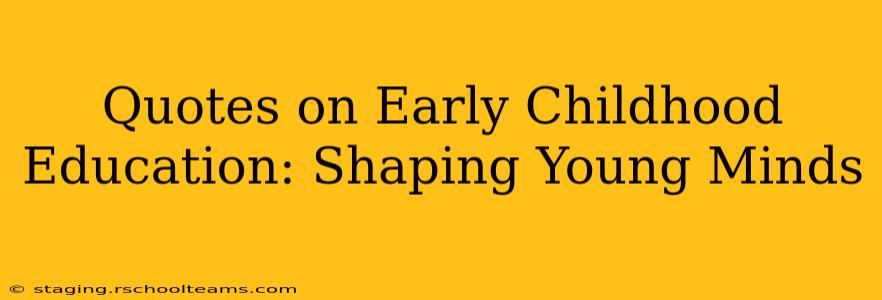Early childhood education (ECE) plays a pivotal role in a child's development, laying the foundation for future academic success and overall well-being. The impact of quality ECE programs is profound and far-reaching, shaping young minds in ways that resonate throughout their lives. This article explores the importance of ECE through insightful quotes from prominent figures and delves into frequently asked questions about its significance.
The Power of Early Learning: Why ECE Matters
Numerous studies highlight the long-term benefits of early childhood education. It's not just about academics; it's about fostering social-emotional development, building crucial life skills, and cultivating a lifelong love of learning. As Maria Montessori famously stated, "Education is a natural process carried out by the human individual, and is acquired not by listening to words, but by experiences." This quote perfectly encapsulates the hands-on, experiential nature of effective ECE.
High-quality early learning environments provide children with opportunities to explore, experiment, and discover. They learn through play, interaction, and carefully designed activities that cater to their developmental stage. This approach helps them develop cognitive skills, language abilities, and social competencies that are essential for future success.
What Makes Early Childhood Education Effective?
Effective ECE goes beyond simply providing childcare. It requires a thoughtful and comprehensive approach that considers several key aspects:
- Qualified Educators: Experienced and well-trained teachers are crucial. They understand child development and possess the skills to create engaging and stimulating learning environments.
- Developmentally Appropriate Practices: Curricula and activities should align with children's developmental stages, ensuring learning is challenging yet achievable.
- Play-Based Learning: Play is a fundamental aspect of early childhood learning. It allows children to explore their creativity, solve problems, and develop social skills in a natural and engaging way.
- Supportive Environment: A safe, nurturing, and stimulating environment is paramount. This includes physical spaces, social interactions, and emotional support from educators.
- Parent Involvement: Strong partnerships between educators and parents are crucial for children's success. Open communication and collaboration enhance the learning experience.
Frequently Asked Questions (FAQs) about Early Childhood Education
This section addresses some common questions regarding the importance and impact of ECE.
What are the long-term benefits of early childhood education?
Research consistently demonstrates that children who participate in high-quality ECE programs achieve better academic outcomes, including higher test scores and improved literacy and numeracy skills. These benefits extend beyond academics, leading to improved social-emotional development, reduced behavioral problems, and increased likelihood of graduating from high school and pursuing higher education. In the words of Albert Einstein, "It is the supreme art of the teacher to awaken joy in creative expression and knowledge." ECE facilitates this joy, fostering a lifelong love of learning.
How does early childhood education impact a child's social and emotional development?
ECE provides opportunities for children to interact with peers, develop social skills such as cooperation and empathy, and learn to regulate their emotions. Through play and social interactions, children learn to navigate social situations, resolve conflicts, and build positive relationships. This strong foundation contributes to their overall well-being and success in later life.
At what age should children start early childhood education?
There is no single answer to this question, as it depends on individual circumstances and family choices. However, many experts recommend that children begin participating in ECE programs from as early as age three, as this is a crucial period for brain development and skill acquisition. Early intervention can be particularly beneficial for children from disadvantaged backgrounds or those with developmental delays.
Is early childhood education worth the investment?
Absolutely! The long-term benefits of ECE far outweigh the costs. Studies show that investing in high-quality ECE programs results in significant returns, including increased workforce participation, reduced crime rates, and improved overall societal well-being. While the initial investment may seem substantial, the long-term economic and social returns make it a worthwhile investment for families, communities, and society as a whole. In the words of Nelson Mandela, "Education is the most powerful weapon which you can use to change the world." ECE is a crucial first step in wielding that power.
How can parents find high-quality early childhood education programs?
Parents should research programs carefully, considering factors such as teacher qualifications, curriculum, safety standards, and parent involvement opportunities. They can also consult with local child care resource and referral agencies, review online reviews, and visit programs to observe the learning environment firsthand.
In conclusion, investing in early childhood education is an investment in our future. By providing children with high-quality learning experiences during these formative years, we empower them to reach their full potential and contribute meaningfully to society. The quotes and insights shared here underscore the critical role of ECE in shaping young minds and building a brighter future.
